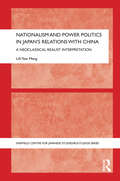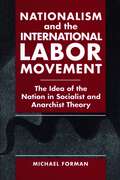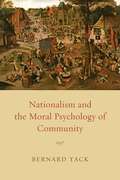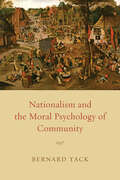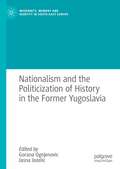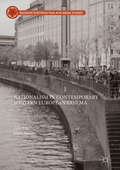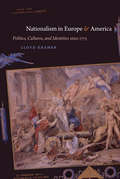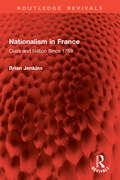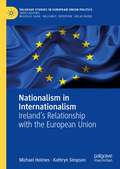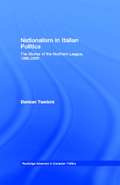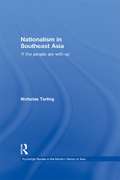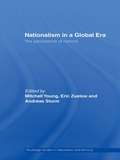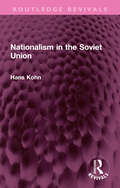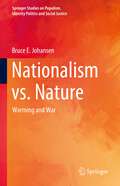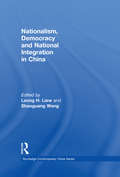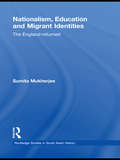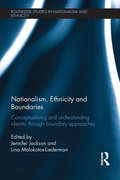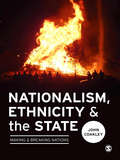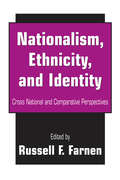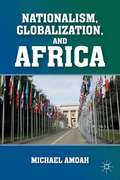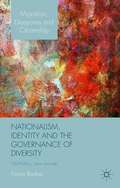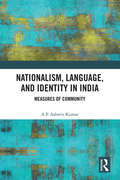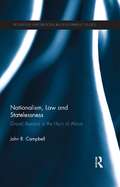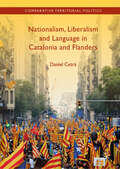- Table View
- List View
Nationalism and Power Politics in Japan's Relations with China: A Neoclassical Realist Interpretation (The University of Sheffield/Routledge Japanese Studies Series)
by Yew Meng LaiDespite flourishing economic interactions and deepening interdependence, the current political and diplomatic relationship between Japan and China remains lukewarm at best. Indeed, bilateral relations reached an unprecedented nadir during the spring of 2005, and again more recently in autumn 2012, as massive anti-Japanese demonstrations across Chinese cities elicited corresponding incidents of popular anti-Chinese reprisal in Japan. This book systematically explores the complex dynamics that shape contemporary Japanese-Chinese relations. In particular, it analyses the so-called ‘revival’ of nationalism in post-Cold War Japan, its causality in redefining Japan’s external policy orientations, and its impact on the atmosphere of the bilateral relationship. Further, by adopting a neoclassical realist model of state behaviour and preferences, Lai Yew Meng examines two highly visible bilateral case studies: the Japanese-Chinese debacle over prime ministerial visits to Yasukuni Shrine, and the multi-dimensional dispute in the East China Sea which comprises the Senkaku/Diaoyudao territorial row, alleged Chinese maritime incursions, and bilateral competition for energy resources. Through these examples, this book explores whether nationalism really matters; when, and under what circumstances nationalism becomes most salient; and the extent to which the emotional dimensions of nationalism manifest most profoundly in Japanese state-elites’ policy decision-making. This timely book will be of great interest to students and scholars of both Japanese and Chinese politics, as well as those interested in international relations, nationalism, foreign policy and security studies more broadly.
Nationalism and War
by John A. Hall Sinia MaleeviHas the emergence of nationalism made warfare more brutal? Does strong nationalist identification increase efficiency in fighting? Is nationalism the cause or the consequence of the breakdown of imperialism? What is the role of victories and defeats in the formation of national identities? The relationship between nationalism and warfare is complex, and it changes depending on which historical period and geographical context is in question. In 'Nationalism and War', some of the world's leading social scientists and historians explore the nature of the connection between the two. Through empirical studies from a broad range of countries, they explore the impact that imperial legacies, education, welfare regimes, bureaucracy, revolutions, popular ideologies, geopolitical change, and state breakdowns have had in the transformation of war and nationalism.
Nationalism and the International Labor Movement: The Idea of the Nation in Socialist and Anarchist Theory (G - Reference, Information and Interdisciplinary Subjects)
by Michael FormanThe resurgence of nationalism accompanying the decline of Communism has been taken to indicate the failure of socialist theory to grasp the nature of this phenomenon. Against both those who argue that the radical tradition has ignored and underestimated nationalism and those who accuse it of economic reductionism, this careful analysis of the idea of the nation as it was developed in the work of the major thinkers of the international labor movement reveals evidence of how seriously they grappled with nationalism.Each of the main sections of the book focuses on the most influential theorists of the international labor movement as it became organized and grew: Bakunin, Marx, and Engels and the concern of the First International (1864–1876) with class solidarity across political borders; Lenin, Luxemburg, and Bauer and the preoccupation of the Second International (1889-1914) with socialism in ethnically plural societies; Stalin and Gramsci in relation to the substitution by the Third International (1919–1943) of nation-building and national liberation for the old class project.In the conclusion, the author examines the relationships among ethnic and civic nationality, national self-determination, republican institutions, and the process of globalization from the perspective of the post-Soviet era and in the light of social theory and Kant's ideas about cosmopolitan right.
Nationalism and the Moral Psychology of Community
by Bernard YackNationalism is one of modern history’s great surprises. How is it that the nation, a relatively old form of community, has risen to such prominence in an era so strongly identified with the individual? Bernard Yack argues that it is the inadequacy of our understanding of community—and especially the moral psychology that animates it—that has made this question so difficult to answer. Yack develops a broader and more flexible theory of community and shows how to use it in the study of nations and nationalism. What makes nationalism such a powerful and morally problematic force in our lives is the interplay of old feelings of communal loyalty and relatively new beliefs about popular sovereignty. By uncovering this fraught relationship, Yack moves our understanding of nationalism beyond the oft-rehearsed debate between primordialists and modernists, those who exaggerate our loss of individuality and those who underestimate the depth of communal attachments. A brilliant and compelling book, Nationalism and the Moral Psychology of Community sets out a revisionist conception of nationalism that cannot be ignored.
Nationalism and the Moral Psychology of Community
by Bernard YackNationalism is one of modern history’s great surprises. How is it that the nation, a relatively old form of community, has risen to such prominence in an era so strongly identified with the individual? Bernard Yack argues that it is the inadequacy of our understanding of community—and especially the moral psychology that animates it—that has made this question so difficult to answer. Yack develops a broader and more flexible theory of community and shows how to use it in the study of nations and nationalism. What makes nationalism such a powerful and morally problematic force in our lives is the interplay of old feelings of communal loyalty and relatively new beliefs about popular sovereignty. By uncovering this fraught relationship, Yack moves our understanding of nationalism beyond the oft-rehearsed debate between primordialists and modernists, those who exaggerate our loss of individuality and those who underestimate the depth of communal attachments. A brilliant and compelling book, Nationalism and the Moral Psychology of Community sets out a revisionist conception of nationalism that cannot be ignored.
Nationalism and the Politicization of History in the Former Yugoslavia (Modernity, Memory and Identity in South-East Europe)
by Gorana Ognjenovic Jasna Jozelic“This book is very timely: the instrumentalization of history for political goals has become a pressing issue and worrisome feature of many polities, to the point of challenging even the most consolidated democracies. Focusing on Yugoslavia’s fragile successor states, the authors explore plurifold analytical levels, including local, regional, transnational, European and global perspectives. The authors comprehensively demonstrate how politicizing history, in the postwar and postcommunist societies of what was once Yugoslavia, has prevented both reconciliation and democratization.”—Sabine Rutar, Leibniz Institute for East and Southeast European Studies, Germany“Ognjenovic and Jozelic focus here on the former Yugoslavia before and after its fragmentation to explore and evaluate the various uses of histories by nationalists, both those who promoted ‘federal nationalism’ and those who peddle specific local nationalisms in successor states. The book deals specifically with the Western Balkans, but these developments have their parallels in many other parts of the world, and the book will be useful well beyond the region on which the study is based.”—Paul Mojzes, Professor Emeritus, Rosemont College, USA“The former Yugoslavia has become a battlefield for the ‘Memory Wars’, in spite of the wealth of judicially established facts and available evidences gathered about the atrocities in the region, and various initiatives aimed at dealing with the past and efforts at transitional justice. Focusing on three periods of Yugoslav history – the Second World War, socialist Yugoslavia and the Yugoslav wars of 1991–2001 – the contributors show that despite these efforts to deal with the past, sustainable peace and reconciliation across ethnic and religious groups remain a distant aim.” —Marijana Toma, Center for Cultural Decontamination, SerbiaThis book analyzes how nationalists in the former Yugoslavia have politicized history to further their political agendas, retaining and prolonging conflict among different cultural and religious groups, and impeding the process of lasting reconciliation. It explores how narratives have been (mis)used, drawing on examples from all of the former Yugoslav republics. With contributors from a range of disciplinary backgrounds, it provides a vital assessment of how nationalists have attempted to (re)shape public collective memory and relativize facts.
Nationalism in Contemporary Western European Cinema (Palgrave European Film and Media Studies)
by James HarveyThis book investigates screen representations of 21st century nationalism—arguably the most urgent and apparent phenomenon in the Western world today. The chapters explore recurrent thematic and stylistic features of 21st century western European cinema, and analyse the ways in which film responds to contemporary developments of mounting tensions and increasing hostilities to difference. The collection blends incisive sociological and historical engagement with close textual analysis of many types of screen media, including popular cinema, art-house productions, low-budget independent work, documentary and video installation. Identifying motifs of nationhood and indigeneity throughout, the contributors of this volume present important perspectives and a timely cultural response to the contemporary moment of nationalism.
Nationalism in Europe & America
by Lloyd KramerExamining the history of nationalism's pervasive influence on modern politics and cultural identities, Lloyd Kramer discusses how nationalist ideas gained emotional and cultural power after the revolutionary upheavals in the late eighteenth-century Atlantic world. Nationalism in Europe and Americaanalyzes the multiple historical contexts and intellectual themes that have shaped modern nationalist cultures, including the political claims for national sovereignty, the emergence of nationalist narratives in historical writing and literature, the fusion of nationalism and religion, and the overlapping conceptions of gender, families, race, and national identities. Kramer emphasizes the similarities in American and European nationalist thought, showing how European ideas about land, history, and national destiny flourished in the United States while American ideas about national independence and political rights reappeared among European nationalists and also influenced the rise of anticolonial nationalisms in twentieth-century Asia and Africa. By placing nationalist ideas and conflicts within the specific, cross-cultural framework of Atlantic history and extending his analysis to the twentieth-century world wars, Kramer offers readers a thoughtful perspective on nationalism's enduring political and cultural importance throughout the modern world.
Nationalism in France: Class and Nation Since 1789 (Routledge Revivals)
by Brian JenkinsFirst published in 1990, Nationalism in France (now with a new preface by the author) is a concise history of the post-revolutionary period in France and provides at the same time an original study of the evolution of French Nationalism since 1789.Brian Jenkins argues that French nationalism can be understood only in the context of class antagonism, and that the nationalisms of left and right have profoundly different social and ideological foundations. Acknowledging the Revolution as the birthplace of the democratic nation state, Jenkins investigates the concepts of nation and class, showing how they are often transformed by the changing social and political context of two centuries of history. He analyses the significant historical events since the French Revolution from the perspective of the growth of the concept of nationhood and national identity. His controversial analysis raises issues of contemporary relevance, such as the debate on the legacy of the French Revolution, the renewed interest in the diversity and viability of the modern nation state and nationalist ideology, and the controversy about the future of radical left-wing politics.This book will be of particular interest to students and researchers of French history and political science.
Nationalism in Internationalism: Ireland's Relationship with the European Union (Palgrave Studies in European Union Politics)
by Kathryn Simpson Michael HolmesThis book interprets the relationship between Ireland and the European Union (EU). We are coming up to 50 years since Ireland acceded to the EU (2023), and the links between the two are unique and distinctive. The volume presents an original interpretation of Irish-EU relations, and this in turn has implications for a wider understanding of the EU. Its aim is to analyse the Irish-EU relationship from the idea of two apparently contradictory political ideas – internationalism (as represented by European integration in this particular instance) and nationalism (long the dominant value in Irish politics). The authors argue that to date the contradictions have been managed with considerable ease, leading us to characterise the Irish-EU relationship as “nationalism within internationalism”.
Nationalism in Italian Politics: The Stories of the Northern League, 1980-2000 (Routledge Advances in European Politics #No.3)
by Damian TambiniThis book is the first full-length study available in English to trace the extraordinary history of the Italian Northern Leagues during the 1980s and 1990s. At a time when the postwar First Republic entered a crisis amid corruption scandals, the Leagues acted as one of the main protest actors and grew at an unprecedented rate. Drawing on electoral and survey data, existing research, eyewitness accounts of protest events and interviews with activists and leaders, this book provides the definitive account of the movement. Damian Tambini analyses why the movement was so successful in mobilising support, and focuses on its most novel aspect: its use of nationalism. The new regionalist movements in Northern Italy, which were unified into the Northern League in 1990, had a huge influence on Italian politics during the period. Written for scholars interested in nationalism, ethnicity and citizenship; and for specialists in European Studies, Italian and ethnic studies, Nationalism in Italian Politics draws on the best Italian and international research to thoroughly analyse the movement, and update classic studies of nationalism in the age of media spectacle.
Nationalism in Southeast Asia: If the People Are with Us (Routledge Studies in the Modern History of Asia #Vol. 26)
by Nicholas TarlingNationalism in Southeast Asia seeks a definition of nationalism through examining its role in the history of southeast Asia, a region rarely included in general books on the topic. By developing such a definition and testing it out, Tarling hopes at the same time to make a contribution to southeast Asian historiography and to limit its 'ghettoization'.Tarling considers the role of nationalism in the 'nation-building' of the post-colonial phase, and its relationship both with the democratic aspirations associated with the winning of independence and with the authoritarianism of the closing decades of the 20th century.
Nationalism in a Global Era: The Persistence of Nations (Routledge Studies in Nationalism and Ethnicity)
by Mitchell Young Andreas Sturm Eric ZuelowThis volume makes a unique contribution to the literature on nations and nationalism by examining why nations remain a vibrant and strong social cohesive despite the threat of globalization. Regardless of predictions forecasting the demise of the nation-state in the global era, the nation persists as an important source of identity, community, and collective memory for most of the world's population. More than simply a corrective to the many scholarly but premature epitaphs for the nation-state, this book explains the continued health of nations in the face of looming threats. The contributors include leading experts in the field, such as Anthony D. Smith, William Safran, Edward Tiryakian as well as younger scholars, whom adopt a variety of approaches ranging from theoretical to empirical and historical to sociological, in order to uncover both the reasons that nations continue to remain vital and the mechanisms that help perpetuate them. The book includes case studies on Ireland, Thailand, Poland, the Baltic States, Croatia and Jordan. Nationalism in a Global Era will be of great interest to students and researchers of international politics, sociology, nationalism and ethnicity.
Nationalism in the Soviet Union (Routledge Revivals)
by Hans KohnFirst published in 1933, Nationalism in the Soviet Union aims at presenting the mentality of the Soviet citizen, of the Communist ‘theology,’ and the way in which it tried to make its peace with the ‘theology’ of nationalism that dominated the world. The author uses the term ‘theology’ intentionally for he argues that both the Soviet Union and the Western civilization are based on the same idea: the secularization of the Biblical faith in world history as a single comprehensive conception; their methods, however, are radically different. The Soviet Union’s understanding and use of nationalism provides deep insight into the nature of nationalism while proving the well-known truth that the emotional appeal of nationalism overrides all other forms of loyalties. Both a personal account and a political note, this book will be of interest to students of political science, international relations, history, geography, and philosophy.
Nationalism vs. Nature: Warming and War (Springer Studies on Populism, Identity Politics and Social Justice)
by Bruce E. JohansenDeveloping an original approach, this book examines how both nationalism and climate change threaten humankind with future catastrophes, arguing that humanity is on a fast track to a dystopian future unless significant changes are implemented. While the world warms, wars driven by nationalism may lead to worldwide devastation, with humankind being caught between two existential threats of its own creation. The author explains how both nationalism and climate change originate from human ingenuity and can only be answered by human cooperation. While, in a perfect world, such problems already would have been solved by the United Nations, this isn't the case in reality. The book discusses how humanity’s many peoples can cooperate to a degree necessary to retain mutual respect without war, in the interest of achieving long-term change which will use technology for mutual good, also “dodging the bullet” of climate change. Offering an outlook into a possible better world, the author also analyzes the massive changes required for everyone to face, discuss, and solve the problems at hand. The book will appeal to students, scholars, and researchers of political science, international relations, and environmental sciences, as well as practitioners and a general audience interested in the study of nationalism, diplomacy, wars, and climate change.
Nationalism, Democracy and National Integration in China (Routledge Contemporary China Series #Vol. 1)
by Leong H. Liew Shaoguang WangThis book examines the changing role of nationalism in China in the light of the immense political and economic changes there during the 1990s. It analyses recent debates between the nationalists (New Left) and liberals in China and examines the roles played by state-sponsored and populist nationalism in China's foreign relations with the West in general and the USA in particular. The issues of Taiwanese nationalism and Tibet and Xinjiang separatism are discussed, with a focus on the questions of the impact of globalisation on national integration or fragmentation and the relationship between democracy and national integration - should democracy precede national integration or could democracy be realised only after national integration, or are democracy and national integration mutually exclusive objectives? The book also examines the roles played by the People's Liberation Army and fiscal system in China in promoting Chinese nationalism and national integration.
Nationalism, Education and Migrant Identities: The England-returned (Routledge Studies in South Asian History)
by Sumita MukherjeeThis book examines the role western-education and social standing played in the development of Indian nationalism in the early twentieth century. It highlights the influences that education abroad had on a significant proportion of the Indian population. A large number of Indian students - including key figures such as Mohandas Karamchand Gandhi, Mohammad Ali Jinnah and Jawaharlal Nehru - took up prominent positions in government service, industry or political movements after having spent their student years in Britain before the Second World War. Having reaped the benefits of the British educational system, they spearheaded movements in India that sought to gain independence from British rule. The author analyses the long-term impact of this short-term migration on Britain, South Asia and Empire and deals with issues of migrant identities and the ways in which travel shaped ideas about the 'Self' and 'Home'. Through this study of the England-Returned, attention is drawn to contemporary concerns about the politicisation of foreign students and the antecedents of the growing South Asian student population in the USA and Europe today, as well as of Britain's growing South Asian diaspora.
Nationalism, Ethnicity and Boundaries: Conceptualising and understanding identity through boundary approaches (Routledge Studies in Nationalism and Ethnicity)
by Jennifer Jackson Lina Molokotos-LiedermanNationalism and ethnicity have become, across time and space, a force in the construction of boundaries. This book analyses geographical and physical borders and symbolic, political and socio-economic boundaries, and how they impact upon nationalism and ethnic identity. Geographic and other tangible borders are critical components in the making and unmaking of boundaries. However, symbolic or intangible boundaries along national, ethnic, political or socio-economic criteria are equally significant. Organised into three sections on theory, national and transnational case studies, this book both introduces existing approaches to the study of boundaries and illustrates how it is possible to apply renewed boundary approaches to better understand nationalism and ethnicity in contemporary contexts. Expert contributors in the field present detailed case studies on the UK, Israel, Estonia, Latvia, Ukraine and Kazakhstan, and draw upon further examples from more than a dozen countries to provide a critical evaluation of the use of borders, boundaries and boundary-making in the study of nationalism and ethnicity. This book will be of interest to students and scholars of International Politics, Nationalism, Racial and Ethnic Politics, Ethnic Identity and Sociology.
Nationalism, Ethnicity and the State: Making and Breaking Nations
by Dr John CoakleyThis exciting new book is the first to offer a truly comprehensive account of the vibrant topic of nationalism. Packed with a series of rich, illustrative examples, the book examines this powerful and remarkable political force by exploring: - Definitions of nationalism - Language and nationalism - Religion and Nationalism - Nationalist history - The social roots of ideologies and the significance of race, gender and class - Nationalist movements, from dominant majorities to peripheral minorities socio-economic and sociological perspectives - State responses to nationalism Supported by a number of helpful illustrations, tables and diagrams, the text is both engaging and highly informative. Nationalism, Ethnicity and the State: Making and Breaking Nations will prove an insightful read for both undergraduate and postgraduate students and researchers in the area of Politics and International Relations.
Nationalism, Ethnicity, and Identity: Cross National and Comparative Perspectives
by Russell F. FarnenNationalism, national identity, and ethnicity are cultural issues in contemporary Western societies. Problems in the United States, the Netherlands, Germany, Austria, Turkey, Poland, Croatia, Ukraine, Hungary, and Bulgaria illustrate both large-scale internal variations in these phenomena and their cross-national relevance for teaching, research, and educational development on such subjects as multiculturalism, ethnic diversity, and socialization.Nationalism, Ethnicity, and Identity, now in paperback, reflects the consequences of rapid change as well as the impact of longstanding social values. Contributors from a number of different countries use a variety of methodological approaches (empirical, quantitative, qualitative, historical, and case study, among others) to analyze important issues. These include anti-Semitism, stereotyping, militarism, authoritarianism, postmodernism, moral development, gender, patriarchy, theory of the state, critical educational theory, Europeanization, and democratic public policy options as related to competing choices among monocultural and multicultural policy options.In addition, contributors examine the situation of minorities in their respective national settings. Chapters cover the impact of mass media, culture, patriotism, and other universal values. This cross-national study is a unique addition to the literature on multiculturalism.
Nationalism, Globalization, and Africa
by Michael AmoahNationalism, especially supranationalism is the bane of global governance, and globalization. Whereas globalization seeks to unify the globe to function to advantage, supranationalisms operate to frustrate the coherence and achievement of this aim. This book delves into the Theories of Nationalism, the contours of supranational activity within global politics, international political economy, and global trade alliances vis-#65533;-vis Africa. The book also identifies a list of African countries with identical issues, serial political difficulties, or time bombs ticking, and examines the performance of their political economies and new security challenges, using global indicators.
Nationalism, Identity and the Governance of Diversity
by Fiona BarkerExamining the evolving responses to immigration, migrant integration and diversity of substate governments in Quebec, Flanders and Brussels, and Scotland, Fiona Barker explores what happens when the 'new' diversity arising from immigration intersects with the 'old' politics of substate nationalism in decentralized, multinational societies.
Nationalism, Language and Identity in India: Measures of Community
by A P KumarThis book examines linguistic nationalism in India. It focuses on the emergence of language as a marker of identity by analysing themes such as Linguistic Reorganization of States, nationalism, philology, and linguistic identity. Formulating a novel conception of doxastic nature of community experience, the author presents a theory about nationalism as a cultural phenomenon by studying the constraints of western theological apparatuses that limit our understanding of it. The book looks at how an ecclesiastical notion of community is at the heart of the debate around linguistic and national identity – something that is redefining politics the world over. This volume will be useful for scholars and researchers of political studies, political sociology, sociology, historical linguistics and cultural studies.
Nationalism, Law and Statelessness: Grand Illusions in the Horn of Africa (Routledge Explorations in Development Studies)
by John R. CampbellIn 1998 a bloody war erupted in The Horn of Africa between Ethiopia and Eritrea. During the war Ethiopia arrested and expelled 70,000 of its citizens, and stripped another 50,000-plus of their citzenship on the basis of their presumed ethnicity. Nationalism, Law and Statelessness: Grand Illusions in the Horn of Africa examines the events which led up to the war, documents the expulsions and denationalisations that took place and follows the flight of these stateless Ethiopians out of the Horn into Europe. The core issue examined is the link between sovereignty and statelessness as this plays out in The Horn of Africa and in the West. The book provides a valuable insight into how nations create and perpetuate statelessness, the failure of law, both national and international, to protect and address the plight of stateless persons, and the illusory nature of nationalism, citizenship and human rights in the modern age. The study is one of a very few which examines the problem of statelessness through the accounts of stateless persons themselves. This book will be of great interest to students and researchers in anthropology, law, politics, African studies and refugee studies as well as professionals and all those interested in stateless persons in the West, including Eritreans, who continue to be denied basic rights.
Nationalism, Liberalism and Language in Catalonia and Flanders (Comparative Territorial Politics)
by Daniel CetràIs liberalism really compatible with nationalism? Are there limits to linguistic nation-building policies? What arguments justify the imposition of national languages? This book addresses these questions by examining the linguistic disputes in Catalonia and Flanders, two major cases of sub-state nationalism. The book connects two strands of arguments: the political arguments around contested linguistic policies, drawing on a rich set of primary and secondary sources, and the theoretical arguments around liberalism and nationalism. The study also compares the historical trajectory and political dynamics of Catalan and Flemish nationalism. It shows that the relationship between language and nationhood is politically constructed through state nation-building and minority activism. The findings highlight the relevance and pervasiveness of nationalism in contemporary social and political life. This book will appeal to scholars and upper-level students interested in nationalism, contemporary political theory, the politics of language, and comparative territorial politics.
